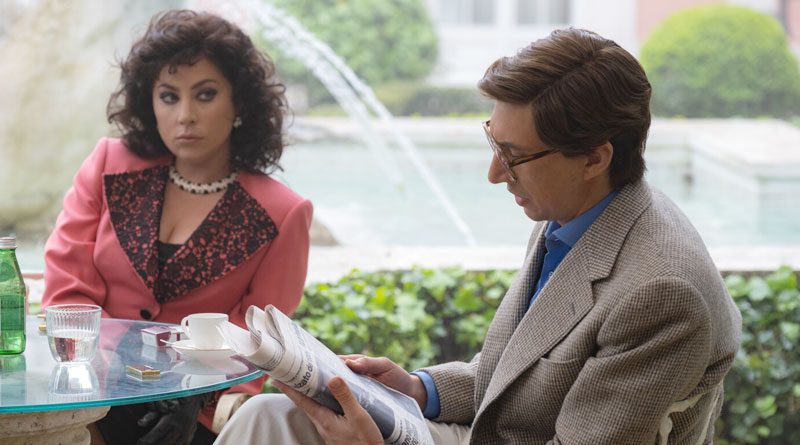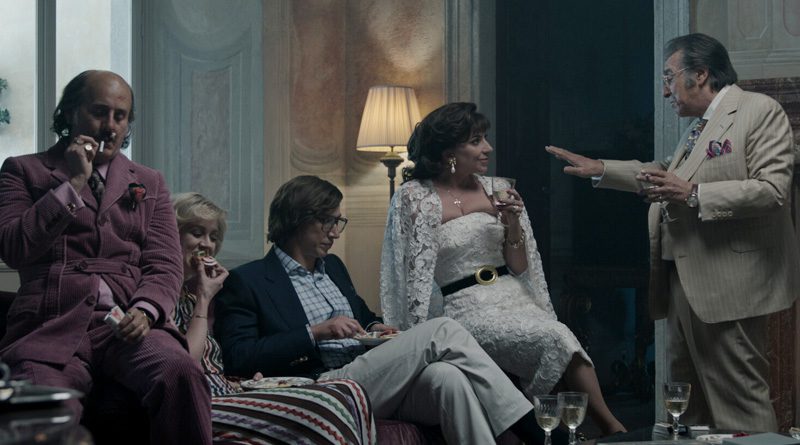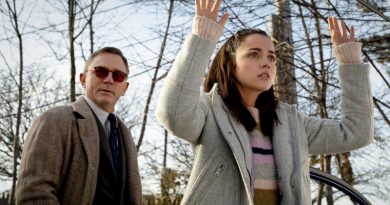House of Gucci (2021) Review
Back in 2000, Martin Scorsese was attached to direct the Gucci biopic. And considering its sensational true story involving the Gucci family feud, greed, money, betrayal and murder, this was certainly right in his wheelhouse. But instead of Scorsese calling the shots, we have Ridley Scott direct the film adapted from Sara Gay Forden’s 2001 book, The House of Gucci: A Sensational Story of Murder, Madness, Glamour, and Greed.
In House of Gucci, the film spans three decades, beginning from the 1970s when we learn that Maurizio Gucci (Adam Driver) is more interested to become a lawyer. His actor-father Rodolfo (Jeremy Irons), however, has always hoped his only son would carry on the family’s legacy in their fashion business. Then one day, Maurizio get to know Patrizia Reggiani (Lady Gaga) at a party and they fall for each other. His father isn’t exactly pleased with his son’s relationship with Patrizia because he sees her more like a gold digger because of their family’s wealth. Maurizio ignores his father’s warning to the extent that he’s willing to move out so he and Patrizia can be together.
Long story short, they get married and everything seems fine at first, with Maurizio now working for Patrizia’s father’s trucking company. Not content with living as commoners for the rest of her life, she subsequently wins over Maurizio’s uncle, Aldo (Al Pacino). From there, she works her way up to ensure she and Maurizio are vital parts of the Gucci empire, even if it means involving double-crossings.

One thing that I like the most about this film is Scott’s stunning visual aesthetics with the help of Dariusz Wolski’s opulent cinematography and Arthur Max’s lavish production design. House of Gucci also successfully captured the glitz and glamour of high fashion, particularly when comes to the film’s 1980s excess. Credits also go to Janty Yates’ era-appropriate costume design, notably on Lady Gaga’s eye-catching dresses.
The adapted story — credited to Becky Johnston (1991’s The Prince of Tides, 1997’s Seven Years in Tibet) and Roberto Bentivegna — is rather a mixed bag. The aforementioned themes as written in my first paragraph are all there and yet, it’s kind of odd that Scott chose to play it straight rather than embrace the story wholeheartedly in the vein of an epic, soap-drama excess. Despite boasting a top-of-the-line cast, only Lady Gaga excels the most with her engaging performance as Patrizia. It’s hard for me to root for Adam Driver’s supposedly pivotal role as Maurizio Gucci because his character is so restrained. All to the point that it almost feels like he’s in a different film altogether, especially with most of his co-stars being either showy or over-the-top.
The latter rings true for Al Pacino, who hams it up in his supporting role as Maurizio’s uncle, Aldo. But nothing beats Jared Leto, who certainly steals the show… except for all the wrong reasons as Aldo’s idiotic son, Paolo. I almost couldn’t recognise him when he first appeared on the screen, thanks to the full prosthetic makeup and ridiculous wig. While I’m okay with Pacino’s familiar overacting style, I find it difficult to enjoy Leto’s exaggerated performance. The way he gestures his body and speaks in an awful, yet grating Italian accent as if he shows up in a parody. I hate to say this but his performance as Paolo is definitely one of Leto’s worst performances I’ve ever seen. Jeremy Irons delivers decent support as Maurizio’s matter-of-fact father, Rodolfo, even though his old-age makeup in subsequent scenes tend to look distracting.

Speaking of the Italian accent, the rest of the cast sounds inconsistent that I wish the film would have been better if only they can speak entirely Italian, with English subtitles displayed on the big screen.
Back to the story, there’s a nagging feeling about how it depicts Patrizia and Maurizio and their respective change of characters’ motivations. It’s jarring and even abrupt, especially the way Maurizio’s drastic turn of character that he becomes ruthless later in the film. This made me wonder whether there are scenes missing from the film because it sure feels like it took a narrative shortcut here. And strangely enough, the film’s runtime is 158 minutes long, which should have been more than enough to portray his character minus all the hasty development.
House of Gucci is far from Ridley Scott’s worst film (that (dis)honour still goes to his 1492: Conquest of Paradise). As mentioned earlier, I do like the technical aspects of this film as well as some of the acting performances but given the high expectation for such a prestige project, it feels like a missed opportunity.





